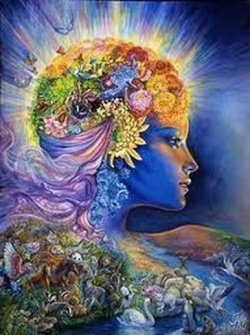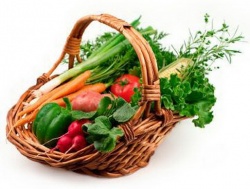Difference between revisions of "Vegetarianism"
| Line 1: | Line 1: | ||
[[File:Image456s.jpg|thumb|250px|]] | [[File:Image456s.jpg|thumb|250px|]] | ||
| − | [[Vegetarianism]] is the practice of not eating meat. Some {{Wiki|vegetarians}} will eat no [[animal]] products – milk, eggs or butter – and are called vegans. [[Vegetarianism]] was just starting to be advocated around the [[Buddha’s]] [[time]] although he was not [[vegetarian]] nor did he require his [[disciples]] to be (M.I,369). There are several places in the [[Tipiṭaka]] where it mentions in passing that the [[Buddha]] or certain [[monks]] or [[nuns]] ate meat. The [[Aṅguttara Nikāya]] says that the [[Buddha]] was once served sūkaramaṁsa with jujube fruit. This term can be translated with certainty as sūkara = {{Wiki|pig}}, maṁsa = meat or flesh (A.III,49). In another place it comments that a man sent his servant to the market to buy meat so it could be prepared and [[offered]] to the [[Buddha]] (A.IV,187). Yet another text describes how a group of [[people]] ‘boiled porridge and {{Wiki|rice}}, made soup and minced meat’ ([[maṁsani kottenti]]) while prepearing a feast for the [[Buddha]] and his [[monks]] (Vin.I,239). On another occasion some men slaughtered a {{Wiki|cow}}, cooked it and then one of them gave ‘the best cuts of the cooked meat’ ([[maṁse pakke varamamamsani]]) to a [[nun]] who subsequently dressed the beef and gave it to the [[Buddha]] (Vin.III,208). One of the criticisms [[Jainism]] directed towards the [[Buddha]] was that he ate meat. ‘Many [[Jains]] went through the town, through the main roads and side streets, the alleys and the lanes, waving their arms and shouting, “ The | + | [[Vegetarianism]] is the practice of not eating meat. Some {{Wiki|vegetarians}} will eat no [[animal]] products – milk, eggs or butter – and are called vegans. [[Vegetarianism]] was just starting to be advocated around the [[Buddha’s]] [[time]] although he was not [[vegetarian]] nor did he require his [[disciples]] to be (M.I,369). There are several places in the [[Tipiṭaka]] where it mentions in passing that the [[Buddha]] or certain [[monks]] or [[nuns]] ate meat. The [[Aṅguttara Nikāya]] says that the [[Buddha]] was once served sūkaramaṁsa with jujube fruit. This term can be translated with certainty as sūkara = {{Wiki|pig}}, maṁsa = meat or flesh (A.III,49). In another place it comments that a man sent his servant to the market to buy meat so it could be prepared and [[offered]] to the [[Buddha]] (A.IV,187). Yet another text describes how a group of [[people]] ‘boiled porridge and {{Wiki|rice}}, made soup and minced meat’ ([[maṁsani kottenti]]) while prepearing a feast for the [[Buddha]] and his [[monks]] (Vin.I,239). On another occasion some men slaughtered a {{Wiki|cow}}, cooked it and then one of them gave ‘the best cuts of the cooked meat’ ([[maṁse pakke varamamamsani]]) to a [[nun]] who subsequently dressed the beef and gave it to the [[Buddha]] (Vin.III,208). One of the criticisms [[Jainism]] directed towards the [[Buddha]] was that he ate meat. ‘Many [[Jains]] went through the town, through the main roads and side streets, the alleys and the lanes, waving their arms and shouting, “ The general Siha has this very day slaughtered a large creature to feed to the [[monk]] [[Gotama]] and he is going to eat it [[knowing]] that it was slaughtered specifically for him.” ‘(A.IV,187). |
[[File:Veg_basket.jpg|thumb|250px|]] | [[File:Veg_basket.jpg|thumb|250px|]] | ||
It seems that [[Jain]] [[teaching]] was influencing other [[ascetics]] to abstain from meat and while some were doing so, others, like the [[Buddha]] were not. The [[ascetics]] [[Kaḷāramyṭṭhaka]], for example, had taken a [[vow]] to consume only meat and [[alcohol]] although this did not prevent him being highly esteemed (D.III,9). | It seems that [[Jain]] [[teaching]] was influencing other [[ascetics]] to abstain from meat and while some were doing so, others, like the [[Buddha]] were not. The [[ascetics]] [[Kaḷāramyṭṭhaka]], for example, had taken a [[vow]] to consume only meat and [[alcohol]] although this did not prevent him being highly esteemed (D.III,9). | ||
| Line 6: | Line 6: | ||
The [[Buddha]] probably did not advocate [[vegetarianism]] because he made a distinction between direct killing – killing an [[animal]] oneself or getting someone else to kill it – and indirect killing – purchasing the meat of an [[animal]] that has already been slaughtered. Killing directly makes one directly responsible for a [[death]], whereas purchasing and eating meat of an [[animal]] killed without one’s consent or [[knowledge]], makes one only distantly responsible. {{Wiki|Vegetarians}} or critics of the [[Buddha]] might think that this is hair-splitting, but actually it is not. Even the strictest {{Wiki|vegetarians}} kill tiny [[animals]] every [[time]] they walk, and the vegetables they eat have been sprayed to kill [[animals]] that might eat or destroy them. Thus the [[vegetarian]] is indirectly and distantly responsible for killing just as the [[person]] who buys meat from a supermarket is. | The [[Buddha]] probably did not advocate [[vegetarianism]] because he made a distinction between direct killing – killing an [[animal]] oneself or getting someone else to kill it – and indirect killing – purchasing the meat of an [[animal]] that has already been slaughtered. Killing directly makes one directly responsible for a [[death]], whereas purchasing and eating meat of an [[animal]] killed without one’s consent or [[knowledge]], makes one only distantly responsible. {{Wiki|Vegetarians}} or critics of the [[Buddha]] might think that this is hair-splitting, but actually it is not. Even the strictest {{Wiki|vegetarians}} kill tiny [[animals]] every [[time]] they walk, and the vegetables they eat have been sprayed to kill [[animals]] that might eat or destroy them. Thus the [[vegetarian]] is indirectly and distantly responsible for killing just as the [[person]] who buys meat from a supermarket is. | ||
| − | However, mature [[Buddhists]] think not just of the effects their [[actions]] have on themselves but the effects they have on others also, and whether one kills an [[animal]] with one’s own hands or buys meat from a supermarket, in both cases a [[sentient being]] is [[dead]] as a result. Consequently, there are [[Buddhists]] who [[feel]] that by not eating meat they are helping to lessen some of the [[cruelty]] in the [[world]], and to this [[degree]] [[vegetarianism]] is more consistent with the | + | However, mature [[Buddhists]] think not just of the effects their [[actions]] have on themselves but the effects they have on others also, and whether one kills an [[animal]] with one’s own hands or buys meat from a supermarket, in both cases a [[sentient being]] is [[dead]] as a result. Consequently, there are [[Buddhists]] who [[feel]] that by not eating meat they are helping to lessen some of the [[cruelty]] in the [[world]], and to this [[degree]] [[vegetarianism]] is more consistent with the general [[spirit]] of the first [[Precept]]. |
In [[Sri Lanka]] [[vegetarianism]] is common although by no means [[universal]] and it is uncommin in [[Burma]], [[Thailand]], [[Laos]], [[Cambodia]] and [[Tibet]]. Many {{Wiki|Chinese}} and [[Korean]] [[Buddhists]] and all {{Wiki|Chinese}} and [[Korean]] [[monks and nuns]] are strictly [[vegetarian]]. | In [[Sri Lanka]] [[vegetarianism]] is common although by no means [[universal]] and it is uncommin in [[Burma]], [[Thailand]], [[Laos]], [[Cambodia]] and [[Tibet]]. Many {{Wiki|Chinese}} and [[Korean]] [[Buddhists]] and all {{Wiki|Chinese}} and [[Korean]] [[monks and nuns]] are strictly [[vegetarian]]. | ||
Revision as of 14:37, 20 March 2014
Vegetarianism is the practice of not eating meat. Some vegetarians will eat no animal products – milk, eggs or butter – and are called vegans. Vegetarianism was just starting to be advocated around the Buddha’s time although he was not vegetarian nor did he require his disciples to be (M.I,369). There are several places in the Tipiṭaka where it mentions in passing that the Buddha or certain monks or nuns ate meat. The Aṅguttara Nikāya says that the Buddha was once served sūkaramaṁsa with jujube fruit. This term can be translated with certainty as sūkara = pig, maṁsa = meat or flesh (A.III,49). In another place it comments that a man sent his servant to the market to buy meat so it could be prepared and offered to the Buddha (A.IV,187). Yet another text describes how a group of people ‘boiled porridge and rice, made soup and minced meat’ (maṁsani kottenti) while prepearing a feast for the Buddha and his monks (Vin.I,239). On another occasion some men slaughtered a cow, cooked it and then one of them gave ‘the best cuts of the cooked meat’ (maṁse pakke varamamamsani) to a nun who subsequently dressed the beef and gave it to the Buddha (Vin.III,208). One of the criticisms Jainism directed towards the Buddha was that he ate meat. ‘Many Jains went through the town, through the main roads and side streets, the alleys and the lanes, waving their arms and shouting, “ The general Siha has this very day slaughtered a large creature to feed to the monk Gotama and he is going to eat it knowing that it was slaughtered specifically for him.” ‘(A.IV,187).
It seems that Jain teaching was influencing other ascetics to abstain from meat and while some were doing so, others, like the Buddha were not. The ascetics Kaḷāramyṭṭhaka, for example, had taken a vow to consume only meat and alcohol although this did not prevent him being highly esteemed (D.III,9).
The Buddha probably did not advocate vegetarianism because he made a distinction between direct killing – killing an animal oneself or getting someone else to kill it – and indirect killing – purchasing the meat of an animal that has already been slaughtered. Killing directly makes one directly responsible for a death, whereas purchasing and eating meat of an animal killed without one’s consent or knowledge, makes one only distantly responsible. Vegetarians or critics of the Buddha might think that this is hair-splitting, but actually it is not. Even the strictest vegetarians kill tiny animals every time they walk, and the vegetables they eat have been sprayed to kill animals that might eat or destroy them. Thus the vegetarian is indirectly and distantly responsible for killing just as the person who buys meat from a supermarket is.
However, mature Buddhists think not just of the effects their actions have on themselves but the effects they have on others also, and whether one kills an animal with one’s own hands or buys meat from a supermarket, in both cases a sentient being is dead as a result. Consequently, there are Buddhists who feel that by not eating meat they are helping to lessen some of the cruelty in the world, and to this degree vegetarianism is more consistent with the general spirit of the first Precept.
In Sri Lanka vegetarianism is common although by no means universal and it is uncommin in Burma, Thailand, Laos, Cambodia and Tibet. Many Chinese and Korean Buddhists and all Chinese and Korean monks and nuns are strictly vegetarian.
See Devadatta and Non-killing Days.
Vegetarianism, Bodhipaksa, 1999.

